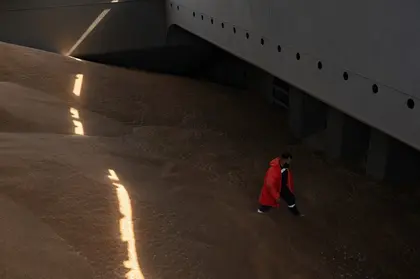Russia has suspended participation in the grain export deal, claiming the attack on its ships in Sevastopol, which it called “an act of terrorism,” was the reason. It may sound paradoxical, since Russian warships are actively attacking Ukraine’s civil energy infrastructure with missiles. At the same time, Dmitry Medvedev, head of Russia’s Security Council, maked no bones about the fact that there will be no light until Ukraine meets Russia’s demands. And for some reason, this is supposed to be rational. Yet when Ukraine responds by attacking these ships armed with missiles aimed at its peaceful cities, it is considered “an act of terrorism.” It just doesn’t get more Orwellian than that.
Clearly, this is just an excuse – for over a month, Russia has been actively negotiating and threatening to scrap the grain deal. Now it can simply cut the talk and walk away. The Kremlin’s plan hinges on the hope that now commercial ships will be afraid to go to Ukrainian ports, and the grain exports will stop.
JOIN US ON TELEGRAM
Follow our coverage of the war on the @Kyivpost_official.
Why does Russia need the deal? Let’s start with the fact that the way the grain agreement was drafted was absolutely unfavorable for Russia. It was important for the economy of Ukraine, both for agriculture and for the macroeconomic situation in general (illustrated by the hryvnia exchange rate). And it gave nothing to Russia. Not a thing, despite all the accusations of treason that flooded the Ukrainian information space. Some claimed Ukraine wouldn’t be able to advance toward Kherson anymore, others alleged that real and mythical sanctions against Russia should be lifted now. But it was just a hoax. The Russian economy received nothing, while the Ukrainian economy was strengthened.

EU Transfers €1.5 Bln Raised From Russian Assets for Ukraine
Russian grain is barely exported. No sanctions are imposed on this export. Moreover, before signing the grain deal, Americans and Europeans confirmed this. But Russia has become too toxic, and very few businesspeople around the globe are willing to deal with Russian counterparties. In the meantime, Ukrainian agricultural products are in high demand.
Russia saw this and was getting more and more annoyed. Just a month ago, Putin began threatening to disrupt the grain deal, arguing that the grain is apparently not going to Africa but to wealthy countries. Obviously, this is absurd. What does Putin really want? He wants to resume the export of fertilizers from Russia. And it so happened that this could only be done through Baltic and Ukrainian ports. That is, through Odesa. So Putin began to bargain.
There is an ammonia pipeline that goes from Tolyatti to Odesa. In Odesa, at the Odesa Port Plant, the ammonia was put on ships. Putin really wants this chain to work again. Ukraine said it can be considered, but it is necessary to add at least the Mykolaiv port to the agreement; and, in the best-case scenario, extend the export corridor to other Ukrainian goods, as opposed to limiting it only to agricultural products.
Why is Ukraine even negotiating with the aggressor? The answer is simple – because it is far more important for us. The importance of open exports for our economy is much greater than the one of ammonia exports for the economy of Russia. It is a key factor now when the opponents are stuck in a battle of attrition. One might say it is dangerous to run the ammonia pipeline now as Russians can hit it – and yes, they can. It could have been a relevant factor if the pipe was empty now, which is clearly not the case. So, it’s not like the risks are going to grow significantly. One might say it remains unclear what is in this deal for Putin, and one would be correct. But perhaps he has some personal financial interest at stake – or the interest of someone important to him.
One way or another, Putin has been bargaining, and now he has raised the stakes. After all, this is the only negotiation strategy he is familiar with – negotiation through escalation.
What happens next? Talks. Russia has already signed a grain deal once. And the factors that forced it to do so are unlikely to have changed. In all probability, Putin will be pressured by Beijing and Delhi again. For them, the issue of food security is of utmost importance, and they are sensitive to rising food prices – for obvious reasons.
Will Putin be able to strike a deal over ammonia? Time will tell. Will we eventually be able to add the port of Mykolaiv to the agreement? That would be good. Is it important for Ukraine to restart the agreement? Incredibly so. But the main thing is that the interests of Ukraine coincide with the interests of China and the entire civilized world. Whereas Russia is once again playing the role of a terrorist who is now taking not only Ukraine hostage, but the whole world as well.
The views expressed in this article are the author’s and not necessarily those of Kyiv Post.
You can also highlight the text and press Ctrl + Enter






